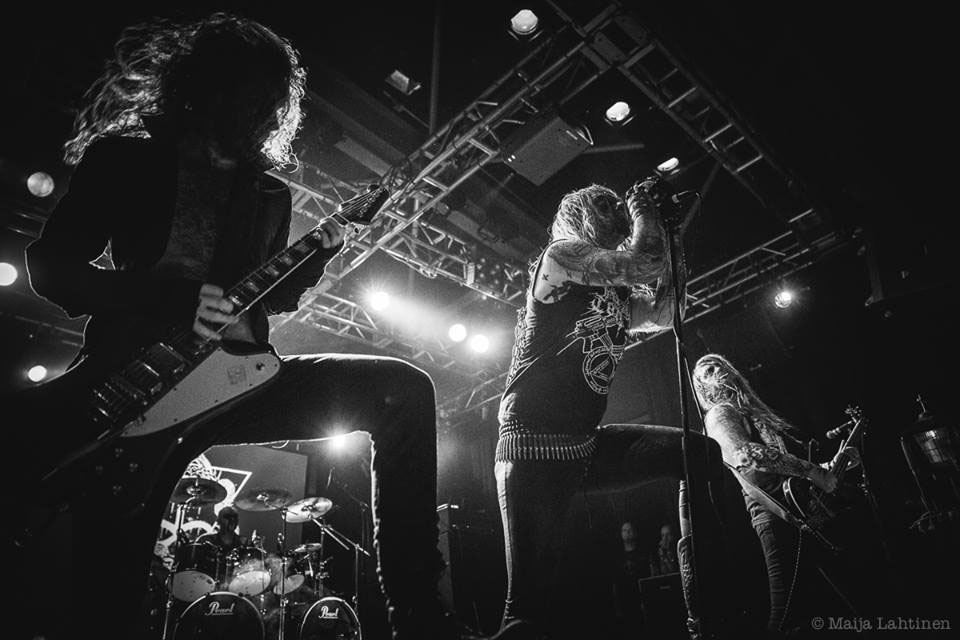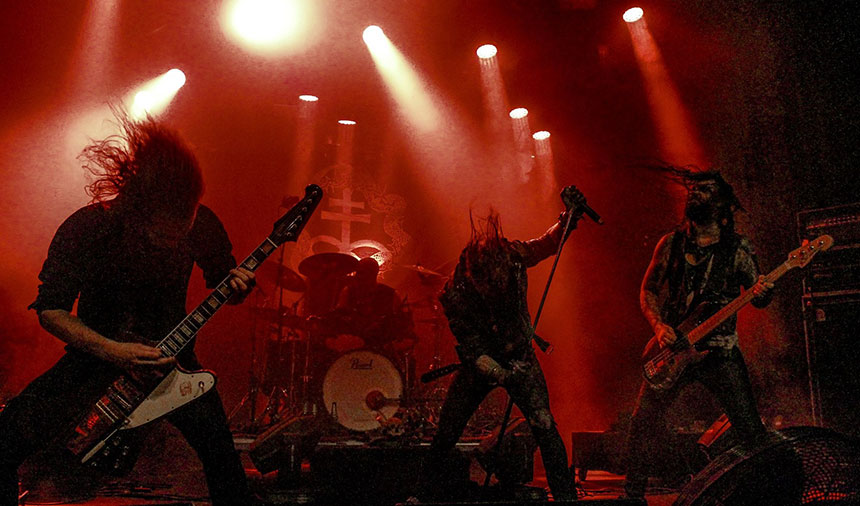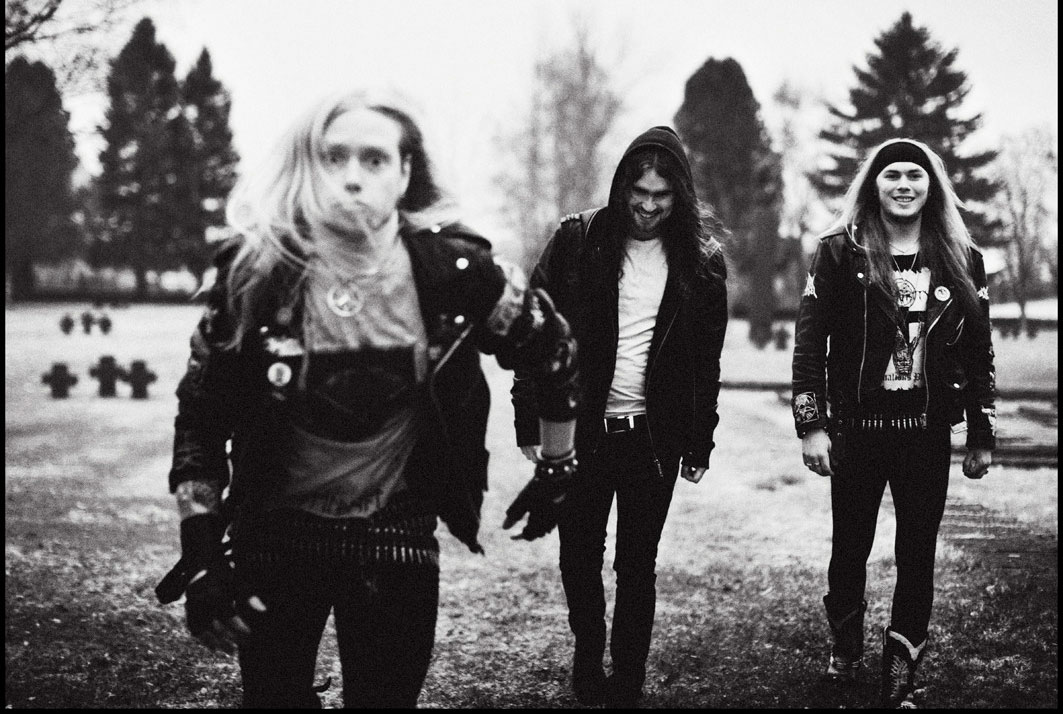One Tail, One Head
2017-08-16
by Niklas Göransson
After eleven years of toiling, Norway’s One Tail, One Head are preparing their debut album. Guitarist Jan Even Åsli speaks of loss and bereavement, of sentience in nature, and whether caving in to dystopian tidings is warranted.
– Our new album, tentatively named “Worlds Open, Worlds Collide”, is now well underway and we’re very pleased with the result thus far. As anyone who’s aware of our existence will know, it’s long overdue – but for all the frustration and irritation when a project takes this long to materialise, I think it’s all been worth it. What’s been taking form right now is very different from what would’ve emerged two years ago, or four years ago.
A taste of what one might expect can be found on the “Firebirds b/w Prowess” twelve-inch EP, scheduled for release on August 24. It features an alternate version of the new song “Firebirds” as well as an additional track which won’t be included on the album; “Prowess”.
– This record encompasses everything essential from our live sets of the past few years but also quite a bit of recent work, which is obviously very refreshing for us and creates a whole new feeling to the record as an entity.
Despite not even having released an album – nor any new material in six years for that matter – ONE TAIL, ONE HEAD have a remarkably high profile on social media and also in concert appearances. I imagine this would have to be at least in part a result of their reputation for convincing live shows.
– Playing gigs to the extent we have is definitely to thank for where we are now. I think it’s fair to say that our early releases belong to the past; live activity is what’s defined us for the last few years. It was on stage we forged the band’s sound and energy – that’s also where we’ve been coming more into our own for each passing year. Needless to say, we’re happy that so many have chosen to follow us throughout it all.
One element of OTOH which strikes a nostalgic chord within me is a certain feeling they manage to conjure up, one rarely found in contemporary black metal. I keep seeing DARKTHRONE references flung their way, but I suspect this sensation is a greater part of the ONE TAIL, ONE HEAD appeal than successfully regurgitating “Panzerfaust” riffs. It’s difficult to put in words, but most readers familiar with this type of music probably know what I mean; a sort of hypnotic woodland entrancement I myself very much associate with “Forest Poetry”-era ILDJARN, nineties TULUS, and the second TRELLDOM album.
– I can see what you’re getting at here. It’s interesting – many share your sentiments and resonate with these primal and trance-like qualities, while others are drawn to the more rock ’n’ roll or punk aspect of our music and choose to highlight that. These two aspects are more or less two sides of the same coin for us, but often expressed as a dichotomy by listeners.
Jan Even adds that some variation of these two perspectives also dominate the feedback on their live performances.
– That’s fascinating to me – there are obviously people in the crowd who perceive what’s taking place on stage so radically different from each other, despite sharing the exact same experience. Anyway, you’re correct in the assumption that there’s no deliberate focus on sounding ‘raw’. My approach to any recording project is to intuitively feel and listen for what kind of sound the material ultimately demands. We believe that, with good help from our engineer, we really found it on the album.

The promotional material describes “Firebirds” as the album’s centrepiece, though it’s not immediately clear whether this is meant in a compositional or thematic sense.
– The track itself has long been a favourite of ours, and we believe it embodies what ONE TAIL, ONE HEAD has been all about up until this point. The more recent material explores a few other directions, but we have yet to see how that pans out.
Could you elaborate a bit on these new directions?
– Hmm, it’s not even entirely clear to any of us yet. What I can say is that we take collective inspiration from a broad musical landscape – not all of which has really surfaced much in our material to date. Not that there’s anything extraordinary about having a wide palate, but these references have brought us to unexpected places. While recording, I could definitely tell that everyone was increasingly enthusiastic about these surprising turns.
As can be concluded from the EP cover artwork, this ‘firebird’ is a reference to the phoenix – a mythological metaphor Jan Even says fits well with the loosely cyclical theme which binds their work together.
– It’s been an overarching lyrical theme since the very beginning and, for me at least, meditating on such matters is definitely a most pragmatic exercise. Nothing is more valuable than reminding oneself about the finite nature of our time here, to make the most out of it – whatever that might mean to each of us. When our time has come, whatever particles we’re made of will seep back into the earth; I find this an encouraging and even comforting thought.
Whereas the Great Leveller has always enjoyed a prominent conceptual presence in extreme metal, ONE TAIL, ONE HEAD have been courted significantly closer than most. On Walpurgis night in 2009, bass player Steingrim Torson passed away in an accident.
– Dealing with that sort of loss forces you to confront and reconsider your entire world-view, at least it did for me. I think this was the case for all of us, everything became very real in a single instant. This is obviously something every human being must go through at some point, in one way or another. Life is fragile, yet at the same time so immensely powerful.
Did experiencing death so closely affect your view of the living?
– It made me think of responsibility in a deeper way; of empathy, friendship and how close-knit we all are, often without fully realising – even in this subculture where individualism is so widely glorified. This whole ordeal didn’t necessarily provide any definite answers but it did, along with many other important life experiences, instil a firm humility in facing the world.

In our pre-interview email exchange, Jan Even mentioned leaning more towards a spiritually sceptic stance. It was thus with limited surprise I learned from the same message that he has almost a decade’s worth of religious studies at university. Especially in metal circles, I’ve noticed how it’s usually the academically inclined types who are prone to harbour a somewhat demystified outlook. This begs the question if greater intellectual insight promotes a more pragmatic attitude, or if it’s simply a case of academia attracting certain kinds of people.
– I’m certainly the lofty, daydreaming, imaginative type myself; have been ever since childhood. A bit of academia doesn’t change that, perhaps it even augments it. To me, scepticism is a skill set for processing one’s surroundings with reason and logic – traits sorely needed in today’s society. It doesn’t necessarily disenchant the world entirely, rather promotes awareness and empowers you. And maybe it makes you somewhat less likely to become an asshole, you know?
Jan Even says the sceptic possesses a mindset well-equipped for resisting the lure of dangerous and poisonous ideologies, but he also searches for truth in all areas where there are actual truths to be found.
– What’s genuinely dangerous is when people are so convinced that what they’re doing is right, either as the will of their god or some other ideological persuasion, that they somehow manage to justify their acts to themselves – no matter how heinous or terrible. I don’t really use the word ’evil’, precisely because the horrors of this world are so often brought about by people whose humanity has been hopelessly lost to the maddening depths of ideological conviction.
I’d have thought eight years in total of what I presume entails gruelling studying to be something a wistful daydreamer would struggle putting himself through.
– Adapting to the rigour of academia was very difficult for me. However, being bad at something doesn’t mean you shouldn’t try – even if it doesn’t end up defining your life in any obvious way, you’ll still learn something in the process. A bit of empathy for others doing the same thing, if nothing else. I’ve always kind of sucked at playing guitar, but if I’d given it up we wouldn’t be having this conversation right now, and that would be a pity.
Jan Even believes the acquisition of new knowledge is always connected to increased humility and remaining grounded.
– Unless you succumb to this sort of arrogant elitism one occasionally encounters. I might add that I’ve come across this far more in various occult black metal types than during all my years in university. I imagine they’ve just discovered Evola or Nietzsche and suddenly consider themselves above everyone else. I don’t know. There are two reactions to this: you either laugh or you cry. I’ve done both.
All that aside, Jan Even says his point is really that everyone should seek to expand their own horizons.
– It doesn’t have to be through academia, although some basic insight into how scientific inquiry works certainly doesn’t hurt. I think curiosity is key, above all. Read, travel, talk to people who live completely different lives than you. Stay open, remain interested.
You mentioned earlier that ONE TAIL, ONE HEAD is more aligned with the physical and direct, is this some manner of atavistic orientation?
– Atavism isn’t something I think much about, or relate to in any significant way. I like to think I’m a progressive, forward-thinking person; this exploration of the physical, semi-wild and sometimes irrational aspects of being human through ONE TAIL, ONE HEAD keeps me grounded in some weird way. I’m not quite sure what it is and, you know – despite some of the weightier matters we’ve been discussing – this band isn’t really a vessel for intellectual or philosophical discourse. Does that make it atavistic? I’m not sure, but I don’t feel that what we do is regressive in any way. There’s a constantly developing sense of purpose to be found here.

Another curiosity I’d learned beforehand is that my interviewee grew up in a rural and rather secluded area.
– We lived on the outskirts of a small town, so I was essentially born and raised in and around the woods. There were days’ worth of forest outside our door and I spent most of my childhood playing in it. That wilderness connection is innate and I’m drawn back to it by intuition on a regular basis, my respect for the natural world runs deep.
Nowadays, Jan Even lives in the city of Trondheim. I presume many of his local friends had an urban upbringing, and so wonder if he’s noticed much of a difference in how they relate to their natural environment.
– Not really. No city in this country is so big that you can’t easily access nearby forests or mountain areas. Being connected and actually making use of it is another matter though. I have yet to figure out why some people develop the same reverence and love I feel whereas others couldn’t care less, even after growing up in similar locations under comparable circumstances. The clarity enabled by even brief periods of time spent among the trees is invaluable to me, simple as that. I’d never trade it for anything. That said, I can be urban if I want to and don’t see these two sides of me in much conflict, really. There are huge advantages to both, and there’s a time for everything.
Given his rural roots in combination with a scholarly acumen, I’m curious what Jan Even makes of consciousness in nature. When I discussed the matter with Stephen Lockhart of REBIRTH OF NEFAST – who is a Bachelor of Agricultural Science, majoring in Forestry – he pointed out how sentience is perhaps debatable in any organism demonstrating self-preserving behaviour. As an example, Lockhart mentioned tropism; the biological process in which part or all of an organism turns in a particular direction in response to external stimuli, be it a plant shoot growing towards sunlight or a root burrowing into nutritious soil. This is arguably indicative of some manner of consciousness and intent, even if they’re not of the kind we’re familiar with.
– These ideas are very interesting and that same innate connection I mentioned earlier could easily accept them, but I don’t have the knowledge to say with any measure of certainty. Perhaps we’ll know for sure further down the road, but there’s definitely no reason to wait for that day in regards to treating the environment in a more sustainable and respectful manner. The dangers and consequences of the current destruction are evident and plain, most people can see that. Sentience or not, we can do much better.
Allergies are on the rise; in a beautifully ironic plot twist, it now seems that living in too sterile an environment is confusing our bodies. Not being exposed to enough pathogens, our immune system will attack harmless antigens and even benign microbial such as pollen – triggering allergy attacks. Since I find it amusing to subject academics to unscientific raving, I wonder if this could be interpreted as nature’s subtle reminder of the abnormality of hominid city dwelling.
– Well, that would be mere speculation. Remember, ’city dwelling’ occurs elsewhere in nature too. Aren’t ant-hills, for example, a metropolitan cooperative of sorts? It’s organised collaboration, just like human cities attempt to, only much better and well-adapted than what we’ve managed so far.
I’m not in any rapturous agreement on this comparison, since an ant-hill is more of a hive-mind organism than a community of individual consciousnesses with conflicting goals and agendas. Adhering to the scientific theory known as Dunbar’s number – basically a calculation of the optimal amount of fellow humans to share a community with – the most commonly used value is one-hundred and fifty. Once a settlement exceeds that cap, they will be forced to introduce restrictions and eventually create laws which require enforcement.
– My comparison might indeed be slightly off when you put it like that and humans will never be like ants, of course. I’m not trying to say there are no problems associated with cities, there are obviously plenty. However, I’m hesitant to just write off urban living as ‘unnatural’. Suggesting that humans are meant to live in small tribes – even with Dunbar’s number in mind – would seemingly cast doubt over most, if not all, human development for the past few thousand years. What of technology – both recent and ancient? The complexities of our languages? The extent of our trade? Our undying urge to explore? Should all of this rather be reversed?
I have no answers, which is why I prefer to be asking the questions.
– Now, I’m no environmental scientist and my understanding is no doubt flawed, but wouldn’t it be much worse if humanity in its vast numbers would suddenly flee our cities and disperse evenly across the planet? Maybe I’m wrong, but it sounds like a complete ecological disaster to me.
The key term here being ‘vast numbers’. Through mankind’s industrious procreation in combination with prolonged life-expectancy, there’s unlikely to be room for anything of the kind until the next great societal reset.
– Putting many minds together in close approximation appears crucial for innovation and creative troubleshooting, which might prove absolutely essential for solving some of the problems we’re facing today. Cooperation on a tremendous scale will be required if we’re ever to come close to those maybe-sentient-or-maybe-not natural systems you’re on about. Maybe living together on a smaller space, in cities, would be the most responsible thing to do after all?
Jan Even adds that he believes green and eco-friendly cities, designed with sustainability in mind, are an important part of the future for our species.
– I’m not so easily willing to regard the modern human as some kind of mistake. As you can probably tell, I’m quite interested in seeing where we’re to go from here; if we can somehow overcome all these issues we struggle with today. There’s so much potential here and I don’t think it’s fair to rule out the possibility that where we are today is just another evolutionary step unfolding – around and within us – even if it’s one we may not yet be fully able to comprehend. My thinking might be terribly flawed, I realise that, but I’m not ready to go dystopian on this despite these troubled times in which so many do just that. Not yet.



